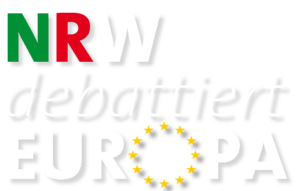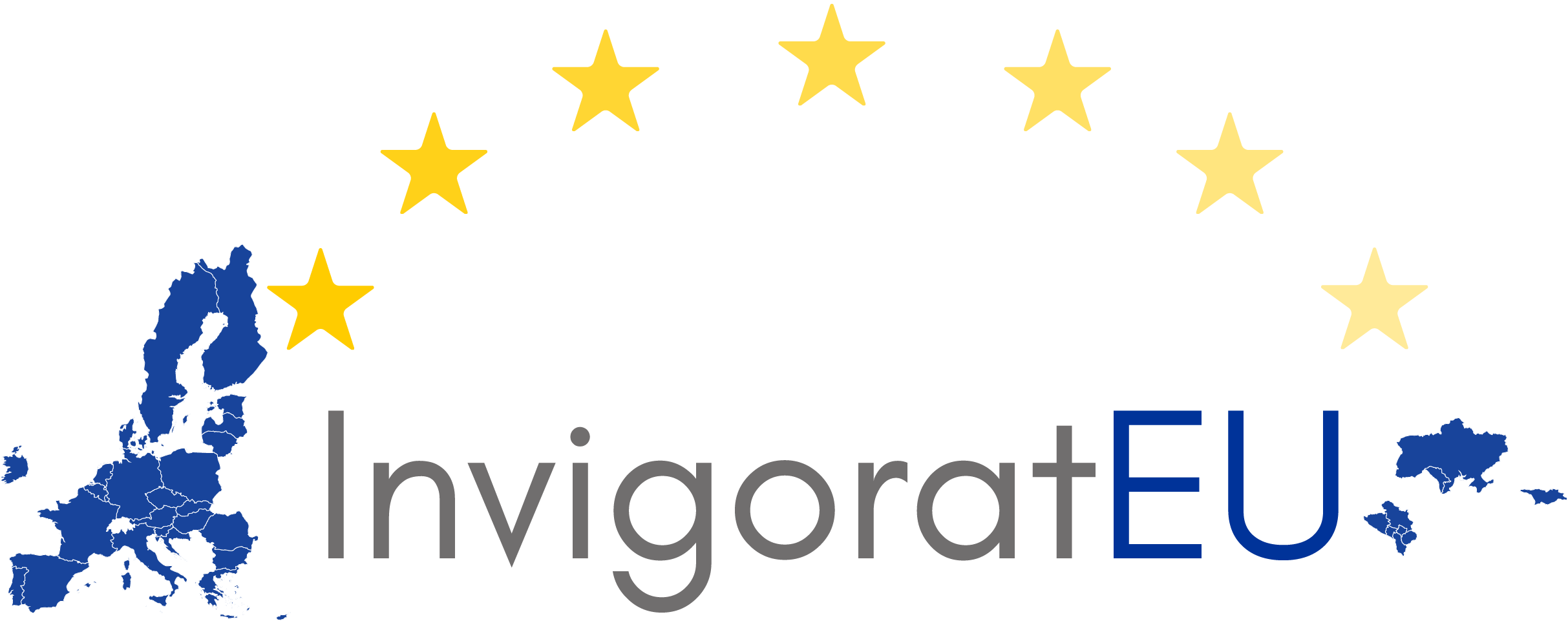Research
My academic research covers books and articles on non-voters at elections in multilevel-governance-structures, European elections, the micromanagement of European Institutions, transposition of EU legislation, norms and values in Member States, forms of classic and alternative forms of EU decision-making (delegated acts and comitology) and the Europeanisation of political systems.
Publications
Please find here the overview of my academic and non-scienctific publications.
Citation Metrics
Here you can find my Google Scholar Metrics and rankings for Political Science, Public Policy & Administration, European Law here.
Recent Publications
[recent_post_carousel="design-3" category="20&post_type=post&wp_http_referer=%2Fwp-admin%2Fedit-tags.php%3Ftaxonomy%3Dcategory" show_date="false" show_content="false" autoplay_interval="5000" show_author="false" media_size="large"]
Fields of Research
Rhinard, M. and M. Kaeding (2006) "The International Bargaining Powr of the European Union in 'Mixed' Competence Negotiations. The Case of the 2000 Cargegana Protocol on Biosafety", in: Journal of Common Market Studies 44 (5): 1023-1050.
European Parliament
Kaeding, M., Haußner, S. und J. Schmälter (2019) "Europawahl Ratgeber 2019: Weichenstellung für die Zukunft", Schwalbach: Wochenschau Verlag.
Obholzer, L., Hurka, S., and M. Kaeding (2019) "Party group coordinators and rapporteurs: Discretion and agency loss along the European Parliament’s chains of delegation", in: European Union Politics 20 (2), pp. 239-260.
Hurka,S., M. Kaeding and L. Obholzer (2015) "Learning on the Job? EU Enlargement and the Assignments of (Shadow) Rapporteurships in the European Parliament", in: Journal of Common Market Studies, 53 (6), 1230-1247.
Kaeding, Michael and Niko Switek (Hrsg.) (2015) "Die Europawahl 2014", Wiesbaden: Springer VS.
Delgado-Márquez, B., M. Kaeding and A. Palomares (2013) "A more balanced composition of the European Parliament with degressive proportionality", in: European Union Politics, 14 (3), 458-471.
Hurka, S. and M. Kaeding (2012) "Report allocation in the European Parliament after eastern enlargement", in: Journal of European Public Policy, 19 (4), 512-429.
Kaeding, M. (2008) "Die Auswahl der Berichterstatter im Europäischen Parlament: Informationsbeschaffer oder Veteilungskämpfer?, in: T. J. Selck and T. Veen (eds.) Die politische Ökonomie des EU Entscheidungsprozesses. Modelle und Anwendungen, Wiesbaden: Springer VS.
Häge, F. and M. Kaeding (2007) "Reconsidering the European Parliament's Legislative Influence under Codecision: Formal Procedure vs. Informal Negotiations", in: Journal of European Integration, 29 (3): 341-362.
Kaeding, M. (2005) "The world of committee reports: Rapporteurship assigbnment in the European Parliament", in: Journal of Legislative Studies,11 (1): 82-104.
Kaeding, M. (2004) "What drives rapporteurship allocation in the European Parliament?", in: European Union Politics, 5 (3): 353-371.
European Commission
Kaeding, M. (2017) "Overriding the European Commission's rulemaking? Practical experience in the European Union with post-Lisbon legislative vetoes with quasi-legislative acts" in: Bruges Politicsl Research Papers, No 64.
Szaprio, M. and M. Kaeding (2013) "The European Commission: A Practical Guide. What it is, what it does, and how it does it", London: John Harper.
EU-Agenturen
Kaeding, M. and F. Krull (2021). Assessing the Potential of EU Agencies for the Future of EU-Turkey Relations, Part I: Turkey's Full Membership without Voting Rights in the EEA and EMCDDA. IPC Policy Brief.
Kaeding, M. (2021). Assessing the Potential of EU Agencies for the Future of EU-Turkey Relations, Part 2: A Systematic Mapping of Cooperation Between EU Agencies and Turkey (1999-2021). IPC Policy Brief.
Kaeding, M. and Z. Demirpolat (2021). Assessing the Potential of EU Agencies for the Future of EU-Turkey Relations, Part 3: Mapping EU Agencies' Coverage in the Turkish Press (2002-2021). IPC Policy Brief.
Kaeding, M. and M. Milenković (2021) External differentiation: Turkey ́s role in EU agencies. InDivEU Working Paper. RSC 2021/85.
Kaeding, M. (2021) "EU agencies and Brexit: Assessing the implications of Brexit for EU agencies", in: EU3D Research Paper No. 20.
Kaeding, M. (2019) "Europäische Argenturen - ein Forschungsfeld im Werden", in: Integration, 42 (1).
Kaeding, M. (2017) "EU-Agenturen, in: W. Weidenfeller und W. Wessels (Hrsg.) Jahrbuch der Europäischen Integration. Baden-Baden: Nomos.
Kaeding, M. (2017) "Europäische Agenturen", in: P. Becker und B. Lippert (Hrsg.) Handbuch Europäische Politik, Wiesbaden: Springer VS.
Kaeding, M. and E. Versluis (2014) "EU Agencies as a Solution to Pan-European Implementation Problems", in: M. Everson, C. Monda and E. Vos (eds.) European Agencies in between Institutions and Member States. Amsterdam: Wolters Kluwer.
Groenleer, M., M. Kaeding and E. Versluis (2010) "Regulatory governance through EU Agencies? The role of the European Agencies for Maritime and Aviation Safety in the Implementation of European Transport Legislation", in: Journal of European Public Policy 17 (8): 1212-1230.
Council of the European Union
Kaeding, M. (2017) "Europäisches Regieren in der Einwanderungsgesellschaft", in: C. Bieber, A. Blätte, K.R. Korte, N. Sweitek (Hrsg.) Regieren in der Einwanderungsgesellschaft. Impulse zur Integrationsdebatte aus Sicht der Regierungsforschung. Wiesbaden: Springer VS.
Kaeding, M. and T. Selck (2005) "Mapping out the Politicsl Europea: Coalition Patterns in EU decision-making", in: International Political Science Review 26 (3): 271-290.
Selck, T. and M. Kaeding (2004) "Divergent Interests, Different Success Rates: France, Germany, Italy, and the United Kingdom in EU Legislative Negotiations", in: French Politics 2 (1): 81-95.
European Central Bank
Heidebrecht, S. and M. Kaeding (2018) "Sitting between European Politics and National Constraints: The Political Economy of the European Central Bank, in: Capital and Credit Markets 51 (1): 1-13.
Kaeding, M. (2007) "Administrative Convergence Actually - An assessment of European Commission's best practices for transposition of EU legislation in France, Germany, Italy, Sweden and Greece", in: Journal of European In
Mastenbroek, E. and M. Kaeding (2006) "Europeanization beyond the goodness-of-it", in: Comparative Euroepan Politics 4: 331-354.
Haußner, S., Kaeding, M. (2020) Political equality without social equality? Social distortion of voter turnout in the European elections 2019 across nine European capitals. in: Research & Politics (2019 European Parliament Elections Special Issue)
Kaeding, M. (2020) (Hrsg.) Special Issue on the European Elections 2019, Research & Politics.
Kaeding, M., M. Müller und J. Schmälter (2020) (Hrsg.) "Die Europawahl 2019", Wiesbaden: Springer VS.
Kaeding, M., Haußner, S. und J. Schmälter (2019) "Europawahl Ratgeber 2019: Weichenstellung für die Zukunft", Schwalbach: Wochenschau Verlag.
Kaeding, M., S. Haußner und M. Pieper (2016) "Nichtwähler in Europa, Deutschland und Nordrhein-Westfalen", Wiesbaden: Springer VS.
Kaeding, Michael und Niko Switek (Hrsg.) (2015) "Die Europawahl 2014", Wiesbaden: Springer VS.
Klassische Entscheidungsfindung
Kaeding, M. (2019) „Out of Balance? Practical Experience in the European Union with Quasi-Legislative Acts“ in: O. Costa (ed) The European Parliament in Times of EU Crisis. Dynamics and Transformations, London: Palgrave Macmillan, pp.: 161-175.
Kaeding, M. and K. Stack (2015) "Legislative Scrutiny? The Political Economy and Practice of Legislative Vetoes in the European Union", in: Journal of Common Market Studies 53 (6): 1268-1284.
Voermans, W., J. Hartmann and M. Kaeding (2014) "The Quest for Legitimacy in EU Secondary Legislation", in: The Theory and Practice of Legislation 2 (1): 5-32.
Kaeding, M. and A. Hardacre (2013) "The European Parliament and the Future of Comitology after Lisbon", in: European Law Journal 19 (3): 382-403.
Kaeding, M. and E. Versluis (2012) "de nieuwe wereld van de Brusslse comitoogie: grote verandering op papier, wenig gevolgen in de praktijk?" in: Bestuurskunde 21 (3): 7-19.
Alternative Entscheidungsfindung
Kaeding, M. and L. Obholzer (2012) "The new kid on the block. European Social Dialogue for Central Public Administrations - an inter-play of formality and informality in EU decision-making", in: S. Smismans (ed.) The European Union and INdustrial Relations - New Procedures, New Context. Manchester: Manchester University Press.
Kaeding, M. (2012) "Towards an Effective European Single Market. Implementing the Various Forms of European Policy Instruments across Member States. Wiesbaden: Springer VS.
Haußner, S. und M. Kaeding (2019) „Der Schein trügt. Eine Analyse der Wahlbeteiligung der Bundestagswahl 2017 auf Bundes-, Landes- und Städteebene im europäischen Kontext“, in K.R. Korte und J. Schoofs (Hrsg.) Die Bundestagswahl 2017, Wiesbaden: Springer VS.
Kaeding, M. and S. Haußner (2018) German elections 2017 – Low voter turnout in the context of the upcoming European elections 2019, TEPSA Brief.
Kaeding, M. (2019) Legitimitätsverlust durch soziale Schieflage der Wahlbeteiligung, in: A. Thiele (Hrsg.) Legitimität in unsicheren Zeiten. Mohr Siebeck: Tübingen.
Haußner, S., M. Kaeding und J. Wächter (2017) "Politische Gleichheit nicht ohne soziale Gleichheit - Die soziale Schieflage niedriger Wahlbeteiligung in Großstädten Nordrhein-Westfalens", in: Journal für Politische Bildung 1 (1): 24-30.
Kaeding, M., S. Haußner und M. Pieper (2016) "Nichtwähler in Europa, Deutschland und Nordrhein-Westfalen", Wiesbaden: Springer VS.
Praktische Umsetzung
Kaeding, M., J. Schmälter and C. Klika (2017) "The EU Pharmacovigilance System and Adverse Drug Reaction Repoting in Practice: A Critical Assessment," in: European Journal of Risk Regulation 8 (4): 772-778.
Kaeding, M., J. Schmälter and C. Klika (2017) "Pharmacovigilance in Europe: Practical implementation across Member States". Wiesbaden: Springer VS.
Anderson, K. and M. Kaeding (2013) "European Integration and Pension Policy change: variable Patterns of Europeanization in Italy, the Netherlands and Belgium", in: British Journal of Industrial Relations. 53 (2): 231-253.
Kaeding, M. (2012) "Towards an EU Regulatory Framework for an Effective Single Market. Implementing the Many Forms of European Policy Imstruments across Member States". Wiesbaden: VS Verlag.
Transposition
Steunenberg, B. and M. Kaeding (2009) "As Time Goes By’: Explaining the Transposition of Maritime Directives", in: European Journal of Politicsl Research 48 (3): 423-453.
Kaeding, M. (2008) "In Search of Better Quality of EU Regulations for Prompt Transposition: The Brussels perspective", in: European Law Journal 14 (5): 115-144.
Kaeding, M. (2008) "In good times and bad: Legal transposition in the European Union. Necessary conditions for timely transposition", in: Policy and Politics 36 (2): 261-282.
Kaeding, M. (2007) "Better Regulation in the European Union: Lost in Translation or Full Steam Ahead? The Transposition of EU Transport Directives across Member States. Leiden: Leiden University Press.
Steuernberg, B., W. Voermans, S. Berglund, A. Dimitrova, M. Kaeding, E. Mastenbroek, A. Meeuwse, M. Romeijn (2006) "The transposition of EC directives. A Comparative Study of Instruments, Techniques and Processes in Six Member States. Nijmegen: Wolf Legal Publishers.
Kaeding, M. (2006) "Determinants of Transposition Delay in the European Union", in: Journal of Public Policy 26 (3): 229-253.
Kaeding, M., Pollak, J. and Paul Schmidt (Ed.) (2022). European Solidarity in Action and the Future of Europe: Views from the Capitals. Springer International Publishing.
Kaeding, M., J. Pollack and P. Schmidt (Ed.) (2020) Eurosceptic Parties and the Future of Europe. Views from the Capitals, London: Palgrave Macmillan.
Kaeding, M., Pollak, J. und P. Schmidt (2020) Europaskeptizismus und die Zukunft Europas. Ansichten aus den Hauptstädten. Integration, S. 136-143.
Kaeding, M., J. Pollack and P. Schmidt (2019) The Future of Europe. Views from the Capitals, London: Palgrave Macmillan.
Kaeding, M. (2013) "Krise und Alternativen im europäischen Integrationsprozess", in: Zeitschrift für Politikwissenschaft 4 (3): 427-436.
Research Projects
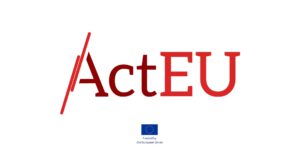
Prof. Kaeding co-lead (zusammen mit Prof. Braun) des neuen Horizon Europe Projekts ActEU
Das Projekt ActEU "Towards a new era of representative democracy - Activating European Citizens’ Trust in Times of Crises and Polarization" beginnt zum 1.3.23 und möchte mit 12 Konsortialpartners aus ganz Europa Antworten auf folgende Fragen finden: Wie können wir politisches Vertrauen und Legitimität über die übliche Umfragefrage "Wie viel Vertrauen haben Sie in das Parlament?" hinaus konzeptualisieren und empirisch messen? Erfordert der Mehrebenencharakter der europäischen repräsentativen Demokratien ein identisches Maß an Unterstützung durch die Bürger*innen auf regionaler, nationaler und EU-Ebene? Inwieweit stellt die soziale Polarisierung bei zentralen politischen Themen unserer Zeit – Einwanderung, Klimawandel und Ungleichheit zwischen den Geschlechtern – das politische Vertrauen in demokratische politische Systeme und deren Legitimität in Frage? Und was können politische Entscheidungsträger und die Zivilgesellschaft tun, um diese Herausforderungen zu meistern?ActEU verfolgt dabei zwei übergreifende Ziele: In Phase 1 untersuchen wir die anhaltenden Probleme des abnehmenden Vertrauens, der Legitimität und der Repräsentation in Europa mit besonderem Augenmerk auf die Polarisierung der Gesellschaften und die Mehrebenenstrukturen der EU. Das an der Universität des Saarlandes ansässige Team unter Leitung von Prof. Dr. Daniela Braun stellt hierzu einen konzeptionellen Rahmen für politische Einstellungen, Verhalten und Repräsentation in ganz Europa zur Verfügung und schafft eine originelle empirische Infrastruktur, die auf einer innovativen Kombination von Methoden und neu erhobenen quantitativen und qualitativen empirischen Daten (Fokusgruppen, experimentelle Umfragen, Web Scraping) basiert. In Phase 2 werden diese Ergebnisse direkt in die Entwicklung eines Instrumentariums von Abhilfemaßnahmen einfließen, um das politische Vertrauen in europäische repräsentative Demokratien und deren Legitimität zu verbessern (u.a. über ein zivilgesellschaftliches Netzwerk, Youth Democracy Labs in 13 europäischen Städten; "Cartooning for democracy").
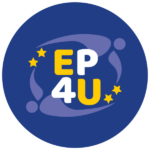
Prof. Kaeding (TEPSA) Advisory Board Member to new EU Project on the EP
EP4U is a project aiming at raising citizens’ awareness of EU policy-making and engage university and high school students, and the broader public, in discussions about the work of the EU and the EP in four policy areas that are considered salient for these audiences: climate and environment; employment and social policies; migration and asylum; and non-discrimination and protection of fundamental rights. These four policy areas are analysed in four different Member States: Finland, France, Bulgaria and Slovakia, whilst the project also reaches trans-national audiences in other Member States. To achieve these aims, TEPSA implements the following activities:
- Events
- Communication activities
- Student paper competitions
- High-school talks
You can find the project factsheet here.

UDE leads EU project on Central Asia relations
While they are situated thousands of kilometres apart and characterised by different political values, Central Asia and the European Union have become important partners. In the Horizon 2020-project “SEnECA – Strengthening and energizing EU-Central Asia Relations” researchers and think tanks will analyse how the relationship between the EU and the Central Asian countries can be further intensified. Prof. Dr. Michael Kaeding, professor for European politics at the University of Duisburg-Essen (UDE) and Dr. Katrin Böttger, Deputy Director of the Institut für Europäische Politik (IEP) are coordinating the project conjointly with financial support from Brussels: The EU is funding the project with about 1.5 million Euros in the following two years.
Kazakhstan, Kyrgyzstan, Tajikistan, Turkmenistan and Uzbekistan: For ten years now, the EU has been pursuing its ‘Strategy for a New Partnership’ in this region. Intersecting Asia and Europe, these countries are of high geopolitical importance. The development and consolidation of stable and democratic societies in these countries is essential to the European Union.
Here is the complete press release.

Prof. Kaeding (TEPSA) Part of H2020 InDivEU project on Differentiated Integration.
InDivEU aims to maximize our knowledge on differentiated integration by systematically pursuing four research objectives: Models, scenarios and visions, the preferences of citizens, governments and parties, causes and effects, and other forms of flexibility.
InDivEU is led by the EUI and ETH Zurich and brings together the key disciplines of political theory, political science, law and economics that ensure the transdisciplinary analysis of Differentiated Integration. The EU H2020 project runs for three years - until 2022. More info at: http://indiveu.eui.eu/
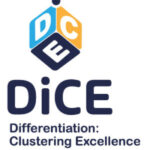
Prof. Kaeding (TEPSA/UDE) Part of H2020 DiCE project on Differentiated Integration
‘Differentiation: Clustering Excellence’ (DiCE) establishes a large research network designed to support policy decisions on EU differentiation. This CSA creates a unique cluster of excellence by bringing together, through their coordinators, the three successful H2020 sister projects on differentiation (EU3D, EU IDEA, InDivEU), which is amplified by the involvement of the TEPSA network and a strategy for including other experts plus UNEXE. DiCE’s overarching objective is to ensure that state-of-the-art research on differentiation is properly translated into policy-relevant advice and made readily accessible to policy-makers at European, national and regional levels of governance and society, better preparing the EU for future differentiation scenarios. The open and inclusive network will become the ‘Who’s Who’ of researchers working on differentiation and the dynamics of European integration. The three projects consist of 38 partner institutions (22 universities, 15 think tanks, 1 media partner) from across Europe involving more than 50 leading scholars and experts on differentiation. TEPSA’s presence in 35 European countries further enlarges the projects’ geographical scope.
More information here.
IPC Working Brief Series: Assessing the Potential of EU Agencies for the Future of EU-Turkey Relations
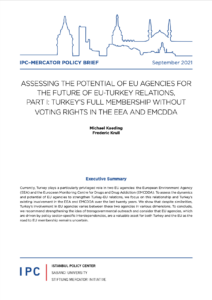
Part I: Turkey's Full Membership without Voting Rights in the EEA and EMCDDA
Assessing the Potential of EU Agencies for the Future of EU-Turkey Relations, Part I: Turkey's Full Membership without Voting Rights in the EEA and EMCDDA. Kaeding, M. & Krull, F. (2021). IPC Policy Brief.
Currently, Turkey plays a particularly privileged role in two EU agencies: the European Environment Agency (EEA) and the European Monitoring Centre for Drugs and Drug Addiction (EMCDDA). To assess the dynamics and potential of EU agencies to strengthen Turkey-EU relations, we focus on this relationship and Turkey’s existing involvement in the EEA and EMCDDA over the last twenty years. We show that despite similarities, Turkey’s involvement in EU agencies varies between these two agencies in various dimensions. To conclude, we recommend strengthening the idea of transgovernmental outreach and consider that EU agencies, which are driven by policy sector-specific interdependencies, are a valuable asset for both Turkey and the EU as the road to EU membership remains uncertain.
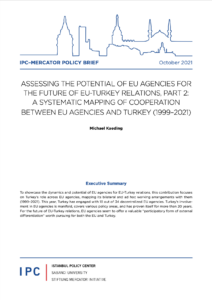
Part 2: A Systematic Mapping of Cooperation Between EU Agencies and Turkey (1999-2021)
Assessing the Potential of EU Agencies for the Future of EU-Turkey Relations, Part 2: A Systematic Mapping of Cooperation Between EU Agencies and Turkey (1999-2021). Kaeding, M. (2021). IPC Policy Brief.
To showcase the dynamics and potential of EU agencies for EU-Turkey relations, this contribution focuses on Turkey’s role across EU agencies, mapping its bilateral and ad hoc working arrangements with them (1999–2021). This year, Turkey has engaged with 18 out of 34 decentralized EU agencies. Turkey’s involvement in EU agencies is manifold, covers various policy areas, and has proven itself for more than 20 years. For the future of EU-Turkey relations, EU agencies seem to offer a valuable “participatory form of external differentiation” worth pursuing for both the EU and Turkey.
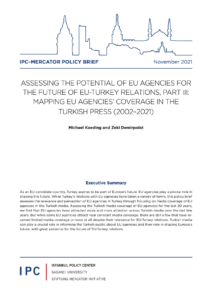
Part 3: Mapping EU Agencies' Coverage in the Turkish Press (2002-2021)
Assessing the Potential of EU Agencies for the Future of EU-Turkey Relations, Part 3: Mapping EU Agencies' Coverage in the Turkish Press (2002-2021). Kaeding, M., & Demirpolat, Z. (2021). IPC Policy Brief.
As an EU candidate country, Turkey aspires to be part of Europe’s future. EU agencies play a pivotal role in shaping this future. While Turkey’s relations with EU agencies have taken a variety of forms, this policy brief assesses the relevance and perception of EU agencies in Turkey through focusing on media coverage of EU agencies in the Turkish media. Assessing the Turkish media coverage of EU agencies for the last 20 years, we find that EU agencies have attracted more and more attention across Turkish media over the last few years. But while some EU agencies attract near-constant media coverage, there are still a few that have received limited media coverage or none at all despite their relevance for EU-Turkey relations. Turkish media can play a crucial role in informing the Turkish public about EU agencies and their role in shaping Europe’s future, with great potential for the future of EU-Turkey relations.
Editor of the Future of Europe series by Springer Verlag
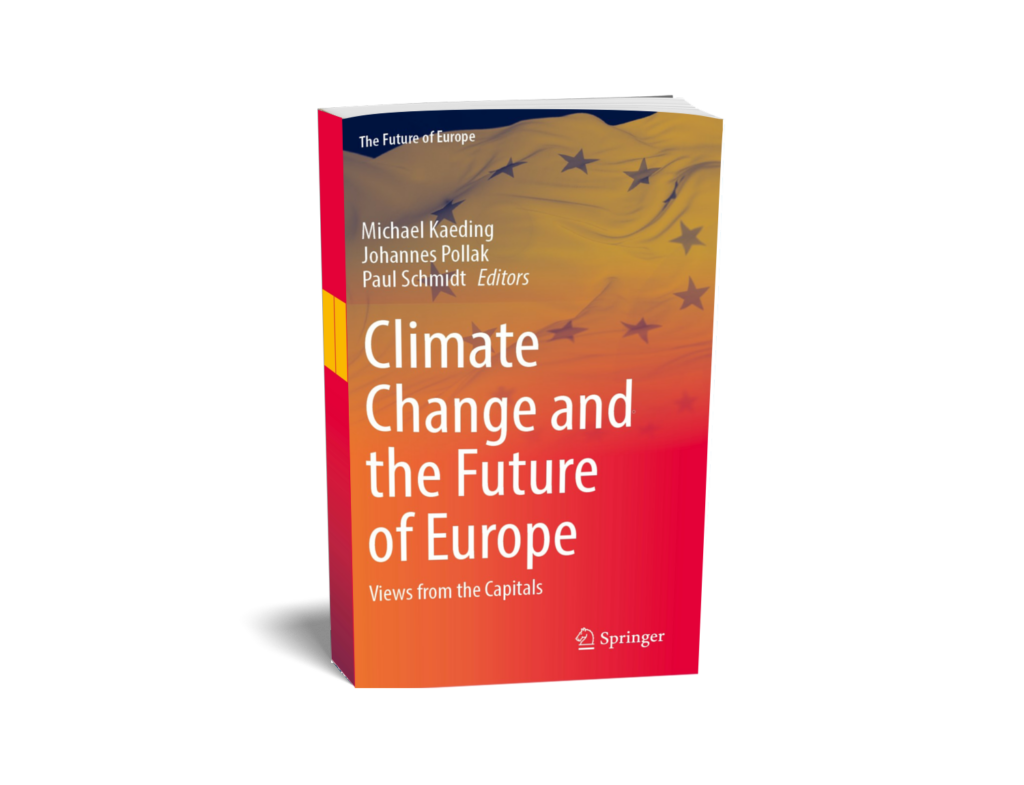
About this book series
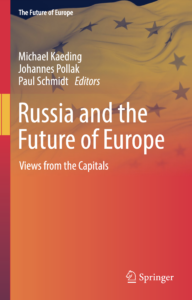

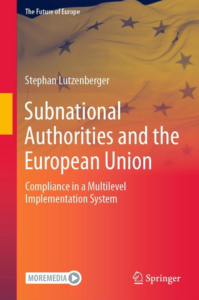
Latest research contributions
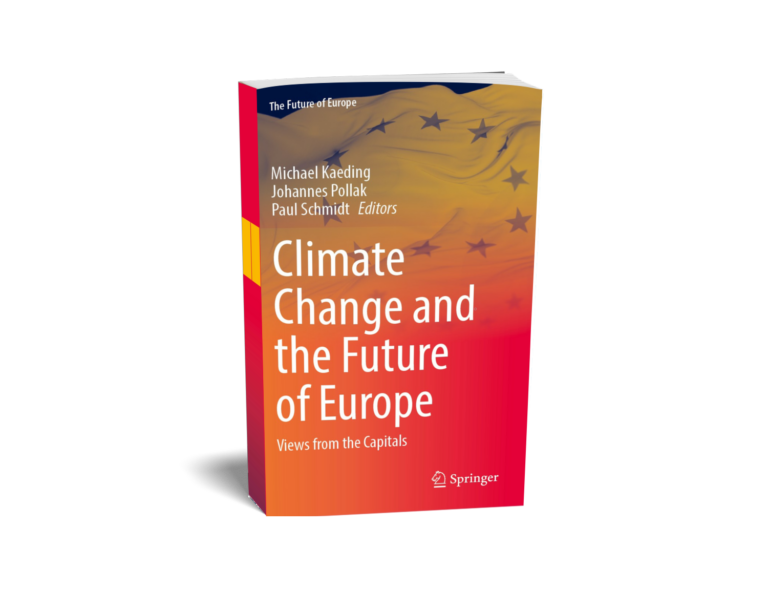
New Publication: Climate Change and the Future of Europe Views from the Capitals
Climate Change and the Future of Europe Views from the Capitals. Kaeding, M., Pollak, J. and Paul Schmidt (Ed.) (2023). Springer International Publishing.
While the ambitious objectives outlined in the EU’s Green Deal aim at making Europe the first climate-neutral continent by 2050, national implementation greatly varies depending on local geographies, history, culture, economics, and politics. This book analyses Member States’ and EU neighbours’ national efforts to combat climate change. It subsequently draws on these factors to highlight local challenges, tensions, and opportunities on the road towards climate neutrality. In the context of inter-country dependencies following Russia’s war against Ukraine, it addresses strategic questions regarding EU integration, the transformation of our economies, the reduction of energy dependencies, and public perception of the above. The book also makes concrete recommendations, in various policy areas, on how individual countries and the EU as a whole should deal with the climate crisis.
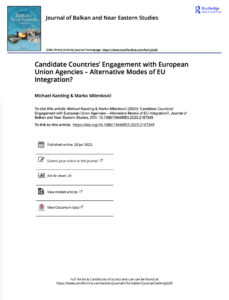
New Publication: Candidate Countries’ Engagement with European Union Agencies – Alternative Modes of EU Integration?
Candidate Countries’ Engagement with European Union Agencies – Alternative Modes of EU Integration? Kaeding, M. and Marko Milenković (2023). Journal of Balkan and Near Eastern Studies
Decentralized EU agencies have played an important role in the Union’s institutional landscape over the last three decades. Various engagement logics and types of cooperation have previously been investigated for the European Economic Area and EU Eastern Partnership countries, but not for the five countries that received EU candidate status by 2021—Turkey and four Western Balkans countries—Montenegro, Serbia, Albania, and Northern Macedonia. Covering the period between 1999 and 2001 analysis found that 23 out of 34 agencies observed had some type of engagement with these candidates, while serving both EU’s broader foreign policy interests and advancing the sector-specific alignment of candidates. This also suggests that it is possible to frame these engagements as a form of external EU differentiation.

New Publication: Russia and the Future of Europe: Views from the Capitals
Russia and the Future of Europe: Views from the Capitals. Kaeding, M., Pollak, J. and Paul Schmidt (Ed.) (2022). Springer International Publishing.
This book sheds light on how Member States and EU neighbours relate to Russia. It includes their historical, financial and political ties, as well as the public perception of the national population vis-à-vis Russia. Each chapter builds on these factors to elucidate the country’s position towards Russia and provides a prediction on the future of these relations. This volume shows the diverse relations that the EU member states and neighbours have with Russia, spanning from tense and confrontational to more eased and friendly, highlighting the contrasts between the national state and the EU as a whole. The book also presents the reader with concrete aspects in different policy areas, via recommendations on how single countries and the EU should deal with Russia. Russia’s invasion of Ukraine on 24th February 2022 will change the relationship between the West and Putin’s Russia for decades to come. No doubt that this blatant violation of International Law and the incomprehensible human suffering of Ukrainian citizens will massively change the attitude of the countries analysed in this book.
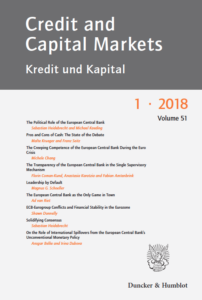
New Publication: External differentiation: Turkey ́s role in EU agencies
External differentiation: Turkey ́s role in EU agencies. Kaeding, M., Milenković, M. (2021) InDivEU Working Paper. RSC 2021/85.
Decentralized EU agencies stand for solutions to European problems assisting in designing and implementing Europe ́s future. An often-neglected feature is the growing outreach of EU agencies towards third countries as a ́participatory form of external differentiation ́. To showcase the dynamic and potential of EU agencies for accession countries this contribution focuses on Turkey ́s role across EU agencies assessing its working arrangements with EU agencies (1999- 2021). We find that Turkey engages with 18 EU agencies in different forms, covering various policy areas and driven by different logics of action.
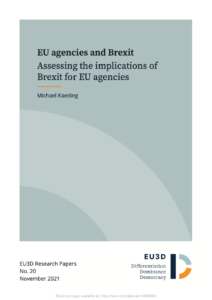
New Publication: EU agencies and Brexit: Assessing the implications of Brexit for EU agencies
EU agencies and Brexit: Assessing the implications of Brexit for EU agencies.Kaeding, M. (2021). EU3D Research Paper No. 20.
This chapter considers implications of Brexit for a set of actors which are often neglected, but without whom the future of Europe has become unthinkable: EU decentralised agencies. It assesses the EU agencies‘role during the Brexit negotiations and those on the future EU-UK relations. It shows how the UK moved from a decisive and respected EU decision maker during 47 years of full EU membership in all EU agencies to one of many rule takers with the status of ‘just another third country’ – despite geographical proximity and considerable EU-UK sector-specific interdependencies. At the end, the chapter discusses the next steps involved in giving effect to the provisions of the EU-UK Trade and Cooperation Agreement on EU agencies and their future relationship with the UK, bearing in mind that ‘uncertainties and contestation about Brexit are only beginning to be resolved’.

New Publication: European Solidarity in Action and the Future of Europe: Views from the Capitals
European Solidarity in Action and the Future of Europe: Views from the Capitals. Kaeding, M., Pollak, J. and Paul Schmidt (Ed.) (2022). Springer International Publishing.
This book sheds light on how member states and EU neighbors reacted to the COVID-19 pandemic through the lens of European solidarity, what they expect from the EU, and other member states, and how they are ready to contribute to common action. The volume reveals how European countries experience and perceive solidarity from the EU and towards the EU in different policy dimensions, such as intra-EU mobility, healthcare and financial and economic aspects of Europe’s recovery. The book offers national perspectives and perceptions of solidarity and concrete aspects in different policy areas. It includes a Foreword by the Vice-presidents of the European Parliament Katarina Barley and Othmar Karas.
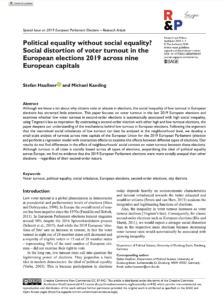
New Publication: Political equality without social equality? Social distortion of voter turnout in the European elections 2019 across nine European capitals
Political equality without social equality? Social distortion of voter turnout in the European elections 2019 across nine European capitals. Haußner, S., Kaeding, M. (2020), in: Research&Politics (2019 European Parliament Elections Special Issue)
Although we know a lot about why citizens vote or abstain in elections, the social inequality of low turnout in European elections has attracted little attention. This paper focuses on voter turnout in the last 2019 European elections and examines whether low voter turnout in second-order elections is automatically associated with high social inequality, using Tingsten’s law as inspiration. By contrasting a second-order election with other high and low turnout elections, the paper deepens our understanding of the mechanisms behind low turnout in European elections. Following the argument that the macrolevel social imbalances of low turnout can best be analysed at the neighbourhood level, we develop a small-scale analysis of turnout across nine capitals of the European Union for the 2019 European Parliament (election and perform a regression model with interaction effects to examine the effects between different types of elections. Our results do not find differences in the effect of neighbourhoods’ social context on voter turnout between these elections. Although turnout in all cities is socially biased across all types of elections, jeopardising the ideal of political equality across Europe, we find no evidence that the 2019 European Parliament elections were more socially unequal than other elections – regardless of their second-order nature.
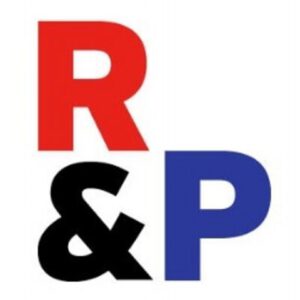
New Publication: R&P Special Issue: European elections 2019
Precisely one year later, after the 2019 European Elections, this Special Issue was published on the initiative of Prof. Michael Kaeding and Stefan Haußner. A total of six articles by eleven authors were published as part of the Special Issue and are available to the public via "open access".
Here you can find the website of the Special Issue.
Here you can find all articles published in the Special Issue:
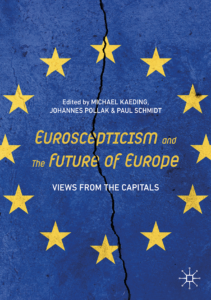
New Publication: Euroscepticism and the Future of Europe: Views from the Capitals
Euroscepticism and the Future of Europe: Views from the Capitals, Kaeding, M., Pollak, J. and P. Schmidt(Ed.) (2020). Palgrave Mcmillian.
This This book sheds light on how the increasing prominence of Eurosceptic and nationalist parties is having an impact on the thinking of mainstream parties, their representatives in the European Parliament, and the future of Europe. It provides perspectives on the future of the European project from authors in all the EU Member States, as well as neighbouring European countries and potential applicant nations.With many Eurosceptic parties now in national government or exerting influence over the national debate, this book maps and analyses the nature and impact of Euroscepticism and nationalism in the different party systems of Europe. As national political parties are the gatekeepers of the process of political representation, they play a pivotal role in mobilizing civil society and in setting the political agenda. They shape politics at a national level, but also determine the way in which Europe plays out—or does not play out—as a political issue. Thus, it is from the national capitals that the very future of Europe emerges. 
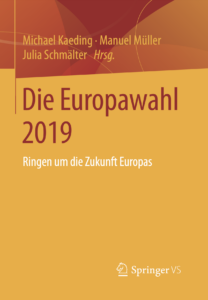
New Publication: Die Europawahl 2019: Ringen um die Zukunft Europas
Die Europawahl 2019: Ringen um die Zukunft Europas, Kaeding, M., Müller, M. und J. Schmälter (Hrsg.) (2020), VS Verlag für Sozialwissenschaften.
Eine erstmals steigende Wahlbeteiligung, eine deutliche Veränderung der Mehrheitsverhältnisse und großer Streit um das Spitzenkandidaten-Verfahren: Die Europawahl 2019 war bewegt wie wenige zuvor. Dieses Buch bietet eine Analyse ihrer zahlreichen Facetten. Schwerpunkte liegen hierbei auf den europäischen Parteien und den Veränderungen in der Parteienlandschaft, der Rolle der Spitzenkandidaten, der öffentlichen Auseinandersetzung, der Wahlbeteiligung und dem Wahlverhalten sowie einem Ausblick auf das neue Parlament. Über Analysen der Europaforschung hinaus sind Perspektiven aus unterschiedlichen Subdisziplinen der (vergleichenden) Politikwissenschaft wie der Wahl-, Parteien-, Kommunikations- oder Regierungsforschung vertreten. Den Beitrag finden Sie hier.
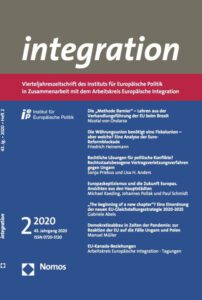
New Publication: Europaskeptizismus und die Zukunft Europas. Ansichten aus den Hauptstädten
Europaskeptizismus und die Zukunft Europas. Ansichten aus den Hauptstädten Kaeding, M., Pollak, J. und P. Schmidt (2020), in: Integration, S. 136-143.
Based on a new anthology on the future of Europe in the light of Euroscepticism, this article examines how the increasing prominence of Eurosceptic and nationalist parties is affecting the thinking of mainstream parties, their representatives in the European Parliament and the future of European integration. The publication of the anthology is timed to coincide with the strategic vision of the European Council, the Council, the Commission and the Parliament as well as with the next phase of the negotiations on the future relations between the European Union (EU) and the United Kingdom and the Conference on the Future of Europe. It maps and analyses 39 national perspectives from all EU Member States as well as from neighbouring European countries and potential candidate countries.
You can find the article here.
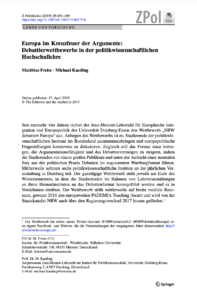
New Publication: Europa im Kreuzfeuer der Argumente: Debattierwettbewerbe in der politikwissenschaftlichen Hochschullehre
Europa im Kreuzfeuer der Argumente: Debattierwettbewerbe in der politikwissenschaftlichen Hochschullehre, Freise, M. und M. Kaeding (2019), in: Zeitschrift für Politikwissenschaft, S. 1-11.
Seit nunmehr vier Jahren richtet der Jean-Monnet-Lehrstuhl für Europäische Integration und Europapolitik der Universität Duisburg-Essen den Wettbewerb „NRW debattiert Europa“ aus. Anliegen des Wettbewerbs ist es, Studierende der politikwissenschaftlichen Institute im Bundesland zusammenzubringen und europapolitische Fragestellungen kontrovers zu diskutieren. Zugleich soll das Format dazu beitragen, die Argumentationsfähigkeit und das Debattiervermögen zu steigern, indem die Studierenden vor einem großen Publikum und unter der Aufsicht einer neutralen Jury aus der politischen Praxis Debatten im sogenannten Wartburgformat führen. Mittlerweile nehmen sechs politikwissenschaftliche Institute an der jährlichen Veranstaltung in Duisburg teil. In ihrem Beitrag beschreiben die beiden Autoren ihre Erfahrungen mit dem Projekt und motivieren dazu, dieses Format zu übernehmen. Den vollständigen Beitrag finden Sie hier.
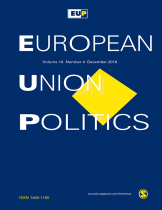
New Publication: Party group coordinators and rapporteurs: Discretion and agency loss along the European Parliament’s chains of delegation
Party group coordinators and rapporteurs: Discretion and agency loss along the European Parliament’s chains of delegation, Obholzer, L., Hurka, S., and M. Kaeding (2019), in: European Union Politics 0 (0), pp. 1-22.
The European Parliament organizes its legislative activities along two chains of delegation to the rapporteurs – one institutional, one partisan. We analyse discretion and agency loss along these chains of delegation from the perspective of party group coordinators who select the rapporteur on behalf of the party group. Do coordinators minimize agency loss towards their national party, their European party group, the committee median or the plenary median when allocating reports? Data from the 2009–2014 legislative term demonstrate that coordinators tend to select rapporteurs who are close to their own national party’s ideal point on the integration dimension. This has important implications for intra-parliamentary and intra-party delegation, party group cohesion and broader policy-making in the European Union.
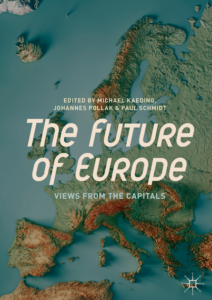
New Publication: The Future of Europe
The Future of Europe. Views from the Capitals, Kaeding, M., Pollak, J. and P. Schmidt (Ed.) (2018). Palgrave Mcmillian: Hampshire.
With a Foreword by the President of the European Parliament, Antonio Tajani, this book sheds light on the political dynamics within the EU member states and contributes to the discussions about Europe. Authors from all member states as well as Iceland, Norway, Switzerland and Turkey assess how their country could get more involved in the European debate, taking the reader on a journey through various political landscapes and different views. The chapters cover issues ranging from a perceived lack of ambition at the periphery to a careful balancing act between diverse standpoints at the geographical centre. Yet, discussions share common features such as the anxiety regarding national sovereignty, the migration and border discourse, security concerns as well as the obvious need to regain trust and create policies that work. The book contributes vigorously to the debate about Europe in all capitals and every corner of the continent, because this is where its future will be decided.

New Publication: Sitting between European Politics and National Constraints: The Political Economy of the European Central Bank
Sitting between European Politics and National Constraints: The Political Economy of the European Central Bank, Sebastian Heidebrecht and Michael Kaeding (2018), in: Capital and Credit Markets (1).
Beyond core functions of central banking, the European Central Bank (ECB) plays a pivotal role in the new European economic and financial governance framework. In the aftermath of the financial crisis the social and institutional embeddedness of the Central Bank, as well as the legal architecture have changed significantly, the Central Bank’s relations with European and international institutions, EU member states and its public have been redefined. Against this backdrop, this special issue aims at analyzing these recent developments by bringing together insights from different disciplines, such as political science, economics, law, and sociology. Senior and junior scholars and practitioners out of the field apply qualitative as well as quantitative research designs focusing on the political economy of the ECB sitting between European politics and national constraints. The researched questions will be: Why has the ECB become a political leader by default in the new European governance structure?, What are the legal contradictions of institutional changes and unconventional monetary policy of the ECB, and the role of the public on European central banking?, What lessons should be learned from the new inter-institutional setting for a safe drive on the road ahead of a more stable European governance structure? Please click here for the full issue.
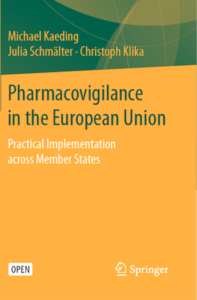
New Publication: Pharmacovigilance in the European Union
Pharmacovigilance in the European Union Michael Kaeding, Julia Schmälter und Christoph Kilka Wiesbaden: Springer
The book presents the results of an in-depth comparative study assessing the implementation of the EU Pharmacovigilance Directive in six EU Member States. By going beyond legal transposition and instead focusing on practical implementation, this study aims to close a gap in EU compliance research. Based on qualitative interviews with relevant actors in Germany, Poland, Portugal, France, Finland and the UK, the authors identify perceived challenges and best-practices, issue recommendations, and thereby contribute to a better understanding of the factors that incentivize or impede the practical implementation of EU drug safety at the national level.

New Publication: Nichtwähler in Europa, Deutschland und Nordrhein-Westfalen
Nichtwähler in Europa, Deutschland und Nordrhein-Westfalen, Michael Kaeding, Stefan Haußner und Morten Pieper (2016) Wiesbaden: Springer
Das Nichtwähler-Problem analysiert: Dieser 2016 erscheinende Band bietet eine aktuelle Bestandsaufnahme der bestehenden Literatur zur sinkenden Wahlbeteiligung in Europa, Deutschland und Nordrhein-Westfalen. Er analysiert die damit verbundene soziale Schieflage auf den verschiedenen Ebenen ergänzt um eigene Analysen und Fallstudien. Er zeigt, dass die soziale Schieflage der Wahlbeteiligung zu einer erheblichen Verschiebung des politischen Angebots und Nachfrage führt. Die aktuell diskutierten Lösungsmöglichkeiten greifen diese Kernprobleme allerdings nicht an, nur die Einführung einer gesetzlichen Wahlteilnahmepflicht ist dazu in der Lage. Dieser Band sucht abschließend konsensuale Fakten, zeigt Lücken auf und bezieht Stellung, wie das Problem der sozialen Schieflage der niedrigen Wahlbeteiligung gelöst werden kann. Der Band wendet sich an Studierende und Lehrende der Sozialwissenschaften, Praktiker, Journalisten und Wissenschaftler im Bereich der Wahlforschung, sowie an weiterführende Schulen und Erwachsenenbildung.
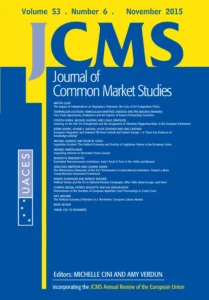
New Publication: Learning on the job? EU enlargement and the assignment of (shadow) rapporteurships in the European Parliament
Learning on the job? EU enlargement and the assignment of (shadow) rapporteurships in the European Parliament, Steffen Hurka, Michael Kaeding and Lukas Obholzer. In: Journal of Common Market Studies.
This article investigates the determinants of assignments to European Parliament negotiating teams comprising both rapporteurs and shadow rapporteurs. We re-examine the argument that underrepresentation of MEPs from new member states on these key posts after enlargement might have been due to a ‘learning phase’. We find that Members of the European Parliament (MEPs) from newer Member states remain considerably less likely to act as rapporteurs during the second term after enlargement (2009-2014). Most importantly, this trend also holds for shadow rapporteurs under the co-decision procedure, that is when they matter most. This structural underrepresentation has potentially important implications for European integration: MEPs from newer Member States are arguably less able to influence legislation. We suggest three readings of the results by asking whether MEPs from these countries are less willing, lacking skills, or disadvantaged. Future research on rapporteurship allocation and legislative careers should seek to answer these questions.

New Publication: Legislative Scrutiny? The Political Economy and Practice of Legislative Vetoes in the European Union
Legislative Scrutiny? The Political Economy and Practice of Legislative Vetoes in the European Union, Kaeding Michael, Kevin Stack (2015), in: Journal of Common Market Studies.
Since 2006, the European Commission has been granted the power to amend legislative acts and not simply implement them. In return, the European Parliament and Council of Ministers have a means to veto Commission actions under the so-called “regulatory procedure with scrutiny” and post-Lisbon “delegated acts”. Based on principles of political economy, we hypothesize that these formal means of oversight will be invoked very infrequently by Parliament and the Council. Using an original data set of legislative vetoes of administrative acts by both legislators from June 2006- April 2014, we show that levels of the formal exercise of the legislative veto to overrule the Commission’s regulatory policies are indeed very low without significant differences between the two European legislators.
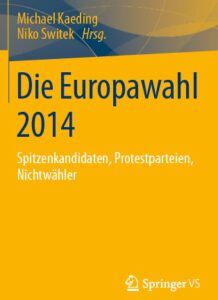
New Publication: Die Europawahl 2014
Die Europawahl 2014 - Spitzenkandidaten, Protestparteien und Nichtwähler, Kaeding, Michael und Niko Switek (Hrsg.) Wiesbaden: Springer.
Welche Neuerungen brachte die Europawahl 2014? Wie prägten die Spitzenkandidaten Wahl und Wahlkampf? Was bedeuten die Gewinne der Protestparteien und die hohe Zahl an Nichtwählern? Die Beiträge in diesem Band diskutieren diese und weitere zentrale Aspekte der Europawahl 2014. Im Besonderen stehen einzelne Mitgliedsstaaten, die Auswirkungen von Finanz- und Schuldenkrise, die Rolle europäischer Parteien und die Konsequenzen der Wahl für das Regieren auf europäischer Ebene im Fokus. Zudem umfasst der Band seltene außereuropäische Perspektiven auf den Wahl(aus)gang und die Beiträge zweier Präsidenten des Europäischen Parlaments (Martin Schulz und Klaus Hänsch).
Weitere Informationen sowie den Zugang zum Ebook des Sammelbandes finden Sie hier.
Downloads & Data
Current lectures
The following publications are listed in the online university bibliography of the University of Duisburg-Essen. Further information may also be found on the person's personal web pages.
Journal articles
-
-
Haußner, Stefan; Kaeding, MichaelPolitical equality without social equality? : Social distortion of voter turnout in the European elections 2019 across nine European capitalsIn: Research & Politics Vol. 7 (2020) Nr. 2,ISSN: 2053-1680Online Full Text: dx.doi.org/ (Open Access)
-
Obholzer, Lukas; Hurka, Steffen; Kaeding, MichaelParty group coordinators and rapporteurs : Discretion and agency loss along the European Parliament’s chains of delegationIn: European Union Politics Vol. 20 (2019) Nr. 2, pp. 239 - 260ISSN: 1741-2757; 1465-1165Online Full Text: dx.doi.org/
-
Heidebrecht, Sebastian; Kaeding, MichaelThe Political Role of the European Central Bank : Between European Politics and National ConstraintsIn: Credit and Capital Markets Vol. 51 (2018) Nr. 1, pp. 1 - 13ISSN: 2199-1235; 2199-1227; 1865-5734; 0023-4591Online Full Text: dx.doi.org/
-
Kaeding, Michael; Haußner, Stefan; Wächter, JoelPolitische Gleichheit nicht ohne soziale Gleichheit : Die soziale Schieflage niedriger Wahlbeteiligung in Großstädten Nordrhein-WestfalensIn: Journal für Politische Bildung Vol. 7 (2017) Nr. 1,ISSN: 2191-8244
-
Klika, Christoph; Kaeding, Michael; Schmälter, JuliaThe EU pharmacovigilance system and adverse drug reaction reporting in practice : a critical assessmentIn: European Journal of Risk Regulation: EJRR Vol. 8 (2017) Nr. 4, pp. 772 - 778ISSN: 1867-299X; 2190-8249Online Full Text: dx.doi.org/
-
Anderson, Karen M.; Kaeding, MichaelEuropean Integration and Pension Policy Change : variable patterns of Europeanization in Italy, the Netherlands and BelgiumIn: British Journal of Industrial Relations Vol. 53 (2015) Nr. 2, pp. 231 - 253ISSN: 1467-8543; 0007-1080Online Full Text: dx.doi.org/
-
Hurka, Steffen; Kaeding, Michael; Obholzer, LukasLearning on the Job? : EU Enlargement and the Assignment of (Shadow) Rapporteurships in the European ParliamentIn: Journal of Common Market Studies Vol. 53 (2015) Nr. 6, pp. 1230 - 1247ISSN: 1468-5965; 0021-9886Online Full Text: dx.doi.org/ Online Full Text (Open Access)
-
Kaeding, Michael; Stack, Kevin M.Legislative Scrutiny? : The Political Economy and Practice of Legislative Vetoes in the European UnionIn: Journal of Common Market Studies Vol. 53 (2015) Nr. 6, pp. 1268 - 1284ISSN: 1468-5965; 0021-9886Online Full Text: dx.doi.org/
-
Voermans, Wim; Hartmann, Josephine; Kaeding, MichaelThe quest for legitimacy in EU secondary legislationIn: Theory and Practice of Legislation Vol. 2 (2014) Nr. 1, pp. 5 - 32ISSN: 2050-8859; 2050-8840Online Full Text: dx.doi.org/
-
Delgado-Márquez, Blanca L.; Kaeding, Michael; Palomares, AntonioA more balanced composition of the European Parliament with degressive proportionalityIn: European Union Politics Vol. 14 (2013) Nr. 3, pp. 458 - 471ISSN: 1741-2757; 1741-2757Online Full Text: dx.doi.org/
-
Kaeding, MichaelKrise und Alternativen im europäischen IntegrationsprozessIn: Zeitschrift für Politikwissenschaft (ZPol) = Journal of Political Science Vol. 23 (2013) Nr. 3, pp. 427 - 436ISSN: 2366-2638; 1430-6387Online Full Text: dx.doi.org/
-
Kaeding, Michael; Hardacre, AlanThe European Parliament and the Future of Comitology after LisbonIn: European Law Journal Vol. 19 (2013) Nr. 3, pp. 382 - 403ISSN: 1468-0386Online Full Text: dx.doi.org/
-
Kaeding, Michael; Versluis, EstherDe nieuwe wereld van de Brusselse comitologie : grote veranderingen op papier, weinig gevolgen in de pratijk?In: Bestuurskunde Vol. 21 (2012) Nr. 3, pp. 7 - 19ISSN: 0927-3387
-
Hurka, Steffen; Kaeding, MichaelReport allocation in the European Parliament after eastern enlargementIn: Journal of European Public Policy Vol. 19 (2012) Nr. 4, pp. 512 - 529ISSN: 1466-4429Online Full Text: dx.doi.org/
-
Groenleer, Martijn; Kaeding, Michael; Versluis, EstherRegulatory governance through agencies of the European Union? : The role of the European agencies for maritime and aviation safety in the implementation of European transport legislationIn: Journal of European Public Policy Vol. 17 (2010) Nr. 8, pp. 1212 - 1230ISSN: 1466-4429; 1466-4429Online Full Text: dx.doi.org/
-
Steunenberg, Bernard; Kaeding, Michael'As time goes by' : Explaining the transposition of maritime directivesIn: European Journal of Political Research Vol. 48 (2009) Nr. 3, pp. 432 - 454ISSN: 1475-6765; 0304-4130Online Full Text: dx.doi.org/
-
Kaeding, MichaelIn search of better quality of EU regulations for prompt transposition : the Brussels perspectiveIn: European Law Journal Vol. 14 (2008) Nr. 5, pp. 583 - 603ISSN: 1468-0386; 1468-0386Online Full Text: dx.doi.org/
-
Kaeding, MichaelLost in translation or full steam ahead : the transposition of EU transport directives across member statesIn: European Union Politics Vol. 9 (2008) Nr. 1, pp. 115 - 143ISSN: 1741-2757Online Full Text: dx.doi.org/
-
Kaeding, MichaelNecessary conditions for the effective transposition of EU legislationIn: Policy & Politics Vol. 36 (2008) Nr. 2, pp. 261 - 281ISSN: 1470-8442Online Full Text: dx.doi.org/
-
Kaeding, MichaelAdministrative Convergence Actually : An Assessment of the European Commission’s Best Practices for Transposition of EU Legislation in France, Germany, Italy, Sweden and GreeceIn: Journal of European Integration Vol. 29 (2007) Nr. 4, pp. 425 - 445ISSN: 1477-2280; 0703-6337Online Full Text: dx.doi.org/
-
Häge, Frank M.; Kaeding, MichaelReconsidering the European Parliament’s Legislative Influence under Codecision : Formal vs. Informal ProceduresIn: Journal of European Integration Vol. 29 (2007) Nr. 3, pp. 341 - 361ISSN: 1477-2280; 0703-6337Online Full Text: dx.doi.org/
-
Mastenbroek, Ellen; Kaeding, MichaelTranscending the Goodness of FitIn: Comparative European Politics Vol. 5 (2007) Nr. 3, pp. 342 - 343ISSN: 1740-388X; 1472-4790Online Full Text: dx.doi.org/
-
Kaeding, MichaelDeterminants of transposition delay in the European UnionIn: Journal of Public Policy Vol. 26 (2006) Nr. 3, pp. 229 - 253ISSN: 1469-7815; 0143-814XOnline Full Text: dx.doi.org/
-
Mastenbroek, Ellen; Kaeding, MichaelEuropeanization Beyond the Goodness of Fit: Domestic Politics in the ForefrontIn: Comparative European Politics Vol. 4 (2006) Nr. 4, pp. 331 - 354ISSN: 1740-388X; 1472-4790Online Full Text: dx.doi.org/
-
Rhinard, Mark; Kaeding, MichaelThe international bargaining power of the European union in 'mixed' competence negotiations : the case of the 2000 cartagena protocol on biosafetyIn: Journal of Common Market Studies Vol. 44 (2006) Nr. 5, pp. 1023 - 1050ISSN: 1468-5965; 1468-5965Online Full Text: dx.doi.org/
-
Kaeding, Michael; Selck, Torsten J.Mapping Out Political Europe : Coalition patterns in EU decision-makingIn: International Political Science Review Vol. 26 (2005) Nr. 3, pp. 271 - 290ISSN: 1460-373X; 0192-5121Online Full Text: dx.doi.org/
-
Kaeding, MichaelThe world of committee reports : rapporteurship assignment in the European ParliamentIn: The Journal of Legislative Studies Vol. 11 (2005) Nr. 1, pp. 82 - 104ISSN: 1743-9337; 1357-2334Online Full Text: dx.doi.org/
-
Selck, Torsten; Kaeding, MichaelDivergent interests, different success rates : France, Germany, Italy, and the United Kingdom in EU legislative negotiationsIn: French politics Vol. 2 (2004) Nr. 1, pp. 81 - 95ISSN: 1476-3419; 1476-3427Online Full Text: dx.doi.org/
-
Kaeding, MichaelRapporteurship allocation in the European Parliament : Information or distribution?In: European Union Politics Vol. 5 (2004) Nr. 3, pp. 353 - 371ISSN: 1741-2757Online Full Text: dx.doi.org/
-
Blog entries
-
-
Kaeding, Michael; Pieper, Morten; Haußner, StefanAbwärts! - Die Fakten zur Wahlbeteiligung im Sinkflug : Die soziale Schieflage der Wahlbeteiligung (Teil 1/5)In: Regierungsforschung.de: Das wissenschaftliche Online-Magazin der NRW School of Governance (2015)Online Full Text (Open Access)
-
Kaeding, Michael; Pieper, Morten; Haußner, StefanDemokratie der Bessergestellten : Die soziale Schieflage der Wahlbeteiligung (Teil 2/5)In: Regierungsforschung.de: Das wissenschaftliche Online-Magazin der NRW School of Governance (2015)Online Full Text (Open Access)
-
Kaeding, Michael; Pieper, Morten; Haußner, StefanEin Kessel Buntes - Maßnahmen zur Steigerung der Wahlbeteiligung : Die soziale Schieflage der Wahlbeteiligung (Teil 4/5)In: Regierungsforschung.de: Das wissenschaftliche Online-Magazin der NRW School of Governance (2015)Online Full Text (Open Access)
-
Kaeding, Michael; Pieper, Morten; Haußner, StefanNutzloser Zwang oder Stein der Weisen? - Die Wahlteilnahmepflicht in der Empirie : Die soziale Schieflage der Wahlbeteiligung (Teil 5/5)In: Regierungsforschung.de: Das wissenschaftliche Online-Magazin der NRW School of Governance (2015)Online Full Text (Open Access)
-
Kaeding, Michael; Pieper, Morten; Haußner, StefanPolitik für die Wählenden, aber nicht für das Volk – Die Folgen der sinkenden Wahlbeteiligung : Die soziale Schieflage der Wahlbeteiligung (Teil 3/5)In: Regierungsforschung.de: Das wissenschaftliche Online-Magazin der NRW School of Governance (2015)Online Full Text (Open Access)
-
Book articles / Proceedings papers
-
-
Haußner, Stefan; Kaeding, MichaelDer erste Eindruck trügt : Eine Analyse der Wahlbeteiligung der Bundestagswahl 2017 auf Bundes-, Landes- und Städteebene im europäischen KontextIn: Die Bundestagswahl 2017: Analysen der Wahl-, Parteien-, Kommunikations- und Regierungsforschung / Korte, Karl-Rudolf; Schoofs, Jan (Eds.) 2019, pp. 177 - 197ISBN: 978-3-658-25049-2; 978-3-658-25050-8Online Full Text: dx.doi.org/
-
Kaeding, MichaelOut of Balance? : Practical Experience in the European Union with Quasi-Legislative ActsIn: The European Parliament in Times of EU Crisis: Dynamics and Transformations / Costa, Olivier (Eds.) 2019, pp. 161 - 175ISBN: 978-3-319-97390-6; 978-3-319-97391-3Online Full Text: dx.doi.org/
-
Kaeding, MichaelEuropäisches Regieren in der EinwanderungsgesellschaftIn: Regieren in der Einwanderungsgesellschaft / Bieber, Christoph; Blätte, Andreas; Korte, Karl-Rudolf; Switek, Niko (Eds.) 2017, pp. 37 - 40ISBN: 978-3-658-15713-5; 978-3-658-15714-2Online Full Text: dx.doi.org/
-
Kaeding, MichaelEU-AgenturenIn: Jahrbuch der Europäischen Integration / Weidenfeld, Werner; Wessels, Wolfgang (Eds.) 2016, pp. 153 - 158ISBN: 978-3-8487-3200-5; 978-3-8452-7564-2
-
Pieper, Morten; Haußner, Stefan; Kaeding, MichaelDie Vermessung des Euroskeptizismus der Alternative für Deutschland (AfD) im Frühjahr 2014In: Die Europawahl 2014: Spitzenkandidaten, Protestparteien, Nichtwähler / Kaeding, Michael; Switek, Niko (Eds.) 2015, pp. 149 - 160ISBN: 978-3-658-05737-4Online Full Text: dx.doi.org/
-
Kaeding, Michael; Switek, NikoEuropawahl 2014 : Spitzenkandidaten, Protestparteien, NichtwählerIn: Die Europawahl 2014: Spitzenkandidaten, Protestparteien, Nichtwähler / Kaeding, Michael; Switek, Niko (Eds.) 2015, pp. 17 - 30ISBN: 978-3-658-05737-4; 978-3-658-05738-1Online Full Text: dx.doi.org/
-
Kaeding, Michael; Versluis, EstherEU agencies as a solution to Pan-European implementation problemsIn: European agencies in between institutionns and member states / Everson, Michelle (Eds.) 2014, pp. 73 - 86ISBN: 978-90-411-2843-0
-
Kaeding, Michael; Obholzer, LukasThe EU and formalisation of sectoral social dialogue : lessons from 40 the sector of central public administrationsIn: The European Union and industrial relations: new procedures, new context / Smismans, Stijn (Eds.) 2012, pp. 40 - 55ISBN: 978-0-7190-8672-4; 0-7190-8672-8
-
Hardacre, Alan; Kaeding, MichaelDelegated and implementing acts : new comitologyIn: How the EU institutions work and ... how to work with the EU institutions / Hardacre, Alan (Eds.) 2011, pp. 179 - 206ISBN: 978-0-9564508-6-9
-
Kaeding, MichaelDie Auswahl der Berichterstatter im Europäischen Parlament : Informationsbeschaffer oder Verteilungskämpfer?In: Die politische Ökonomie des EU-Entscheidungsprozesses: Modelle und Anwendungen / Selck, Torsten (Eds.) 2008, pp. 163 - 182ISBN: 978-3-531-91012-3; 978-3-531-15406-0Online Full Text: dx.doi.org/
-
Books, Collections, Proceedings
-
-
Kaeding, Michael; Müller, Manuel; Schmälter, Julia (Eds.)Die Europawahl 2019 : Ringen um die Zukunft EuropasWiesbaden (2020)ISBN: 978-3-658-29276-8; 3-658-29276-8; 978-3-658-29277-5Online Full Text: dx.doi.org/
-
Kaeding, MichaelThe Carl Schurz Memorial Professorship at the University of WisconsinDuisburg, Essen (2020) 64 SeitenISBN: 978-3-940402-38-7Online Full Text: dx.doi.org/ Online Full Text (Open Access)
-
Kaeding, Michael; Haußner, Stefan; Schmälter, Julia (Eds.)Europawahlratgeber 2019 : Weichenstellung für die ZukunftFrankfurt a.M. (2019) 64 Seiten, Ill.ISBN: 978-3-7344-0810-6; 3-7344-0810-5; 978-3-7344-0811-3
-
Kaeding, Michael; Pollak, Johannes; Schmidt, Paul (Eds.)The Future of Europe : Views from the CapitalsCham (2018) 133 SeitenISBN: 978-3-319-93045-9; 978-3-319-93046-6Online Full Text: dx.doi.org/
-
Kaeding, Michael; Schmälter, Julia; Klika, ChristophPharmacovigilance in the European Union : practical implementation across member statesWiesbaden (2017) 124 SeitenISBN: 978-3-658-17275-6; 978-3-658-17276-3Online Full Text: dx.doi.org/ (Open Access)
-
Kaeding, Michael; Haußner, StefanGut bekannt und unerreicht? : soziodemographisches Profil der Nichtwähler_innenBerlin (2016) 31 Seiten
(Empirische Sozialforschung ; 6)ISBN: 978-3-95861-553-3 -
Kaeding, Michael; Haußner, Stefan; Pieper, MortenNichtwähler in Europa, Deutschland und Nordrhein-Westfalen : Ursachen und Konsequenzen sinkender WahlbeteiligungWiesbaden (2016) 136 SeitenISBN: 978-3-658-11856-3; 978-3-658-11857-0Online Full Text: dx.doi.org/
-
Kaeding, Michael; Switek, Niko (Eds.)Die Europawahl 2014 : Spitzenkandidaten, Protestparteien, NichtwählerWiesbaden (2015) 407 SeitenISBN: 978-3-658-05737-4; 978-3-658-05738-1Online Full Text: dx.doi.org/
-
Szapiro, Manuel; Kaeding, MichaelThe European Commission : a practical guide ; [what it is, what it does, how it does it]London (2013) 378 SeitenISBN: 978-0-9571501-3-3
-
Kaeding, MichaelTowards an effective European single market : implementing the various forms of European policy instruments across member statesWiesbaden (2013) 171 S.ISBN: 978-3-531-19683-1; 3-531-19683-9Online Full Text: dx.doi.org/
-
Steunenberg, Bernard; Voermans, Wim; Berglund, S.; Dimitrova, A.; Kaeding, Michael; Mastenbroek, E.; Meeuwse, A.; Romeijn, M.The transposition of EC directives : a comparative study of instruments, techniques and processes in six member statesLeiden (2006) 207 S.
-
Thesis
-
-
Kaeding, MichaelBetter regulation in the European Union: lost in translation or full steam ahaed? : The transposition of EU transport directives across member statesLeiden (2007) 224 S.ISBN: 978-90-8728-026-0
-
Working Paper
-
-
Kaeding, Michael; Haußner, Stefan;
Trans European Policy Studies Association (Eds.)German elections 2017 : Low voter turnout in the context of the upcoming European elections 2019(2018)
(TEPSA Briefs) -
Kaeding, MichaelIn good times and bad : legal transposition in the European Union; assessing correlational and necessary/sufficient causationLeiden (2008) 59 Seiten
(Working paper ; 04.11.2005)
-
Lectures
-
Kaeding, Michael;Europäische Integration und Europapolitik : Wohin geht die Reise?
Die kleine Form, 07. Juni 2013, Essen,(2013)
(Die kleine Form 2013)
Data for the post on the blog "Der (europäische) Föderalist":
Voting results national level (XLSX)
Data for the following article:
Hurka, S. und M. Kaeding (2012) Report allocation in the European Parliament after eastern enlargement, Journal of European Public Policy 19(4): 512-529


